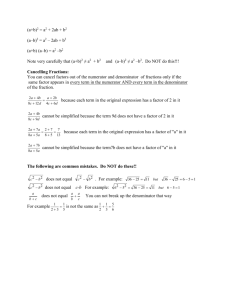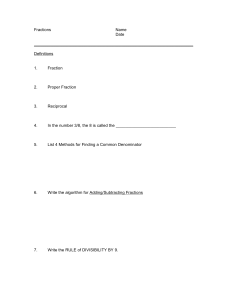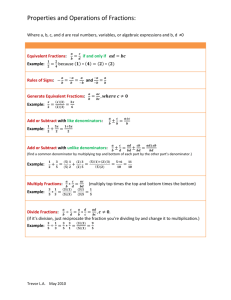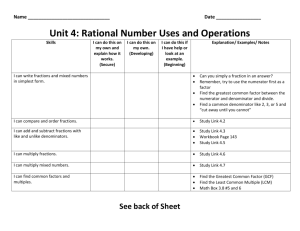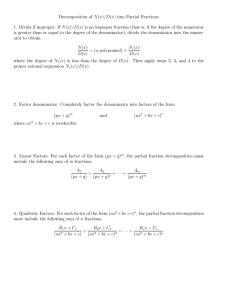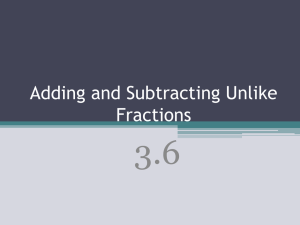Fraction & Mixed Number Addition and Subtraction
advertisement
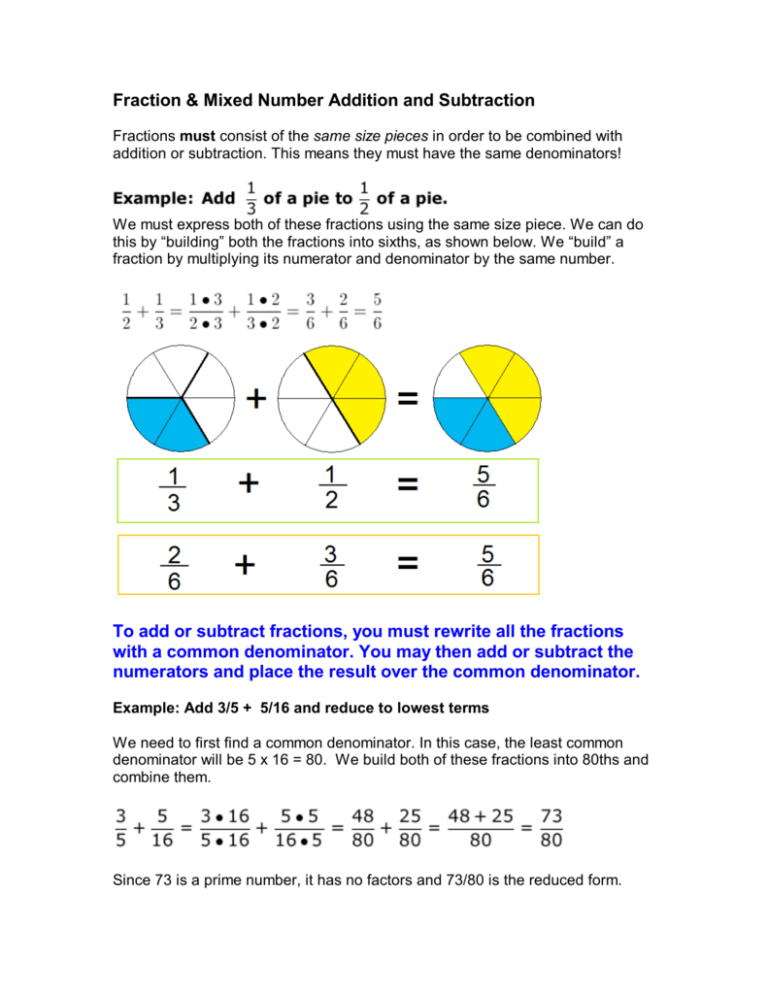
Fraction & Mixed Number Addition and Subtraction Fractions must consist of the same size pieces in order to be combined with addition or subtraction. This means they must have the same denominators! We must express both of these fractions using the same size piece. We can do this by “building” both the fractions into sixths, as shown below. We “build” a fraction by multiplying its numerator and denominator by the same number. To add or subtract fractions, you must rewrite all the fractions with a common denominator. You may then add or subtract the numerators and place the result over the common denominator. Example: Add 3/5 + 5/16 and reduce to lowest terms We need to first find a common denominator. In this case, the least common denominator will be 5 x 16 = 80. We build both of these fractions into 80ths and combine them. Since 73 is a prime number, it has no factors and 73/80 is the reduced form. Example: Add 2/17 + 3/34 + 1/4 and reduce to lowest terms. Here, least common denominator will be the least common multiple of the denominators and is found by either taking multiples of 34 or by writing out the prime factorizations of the denominators: 17 = 17•1, 34 = 2•17, 4 = 22. The least common denominator (LCD) will be 17•22 = 68. Note that we must divide the LCD by each denominator to find out what factor to use to “build” our fraction into 68ths. 68 ÷ 17 = 4, so we multiply top and bottom of 2/17 by 4, 68 ÷ 34 = 2 so we multiply top and bottom of 3/34 by 2, and 68 ÷ 4 = 17 so we multiply top and bottom of ¼ by 17. Example: Subtract 5/32 – 1/8 and reduce. The LCD is 32 in this case, so we only need to “build” 1/8 into 32nds by multiplying both numerator and denominator by 4. CONTINUED ON NEXT PAGE Adding/Subtracting Mixed Numbers: Method 1: Convert the mixed numbers to improper fractions and then add or subtract as with proper fractions. Convert answer back into a mixed number if desired. Example: Add 2 3/5 + 5 1/3 and write the answer as a mixed number. Using Method 1, we write 2 3/5 as 13/5 and we write 5 1/3 as 16/3. We then add the fractions 13/5 + 16/3 by rewriting each of these fractions with the common denominator of 15, as shown below. We can then write our answer of 119/15 as 7 14/15. Example: Subtract 5 1/12 - 3 2/15 and write the answer as a mixed number. Using Method 1, we write 5 1/12 as 61/12 and we write 3 2/15 as 47/15. We then subtract the fractions 61/12 - 47/15 by rewriting each of these fractions with the least common denominator of 60, as shown below. We can then write our answer of 117/60 as 1 57/60, which reduces to 1 19/20. CONTINUED ON NEXT PAGE Adding/Subtracting Mixed Numbers: Method 2: Combine whole number parts and fractions parts. Borrow from the whole number part, if needed, when subtracting fraction parts. Example: Add 2 3/5 + 5 1/3 using Method 2. The whole number parts add up to 2 + 5 = 7. The fraction parts add to 3/5 + 1/3, which requires a common denominator of 15. We get a result of We combine the whole number answer of 7 with the fraction answer of 14/15 to get an answer of 7 14/15, which is what we got using Method 1. Example: Subtract 5 1/12 - 3 2/15 using Method 2. Here we subtract 5-3 to get 2 but when we try to subtract 1/12 – 2/15 by rewriting each fraction in 60ths, , we get 5/60 – 8/60, a negative amount. In this case, we have to “borrow” 60/60 from 5, as shown below. CONTINUED ON NEXT PAGE Rule of Thumb: Rewrite a negative fraction as a negative numerator over a positive denominator. So we can rewrite – 3/5 as (-3)/5, as shown below. The least common denominator is 60, so “build” each fraction into a fraction with a denominator of 60. Then combine the numerators, as shown below. Here, we first rewrite as Now, since the common denominator is 4 x 7 x 3 = 84, we need to “build” each fraction into 84ths. Then combine the numerators with subtraction, as shown below. CONTINUED ON NEXT PAGE In this example, we would add this in the same way we would add 3/11 + 5/11 to get 8/11. We have a common denominator of “k”, so we can combine the numerators with addition to get
